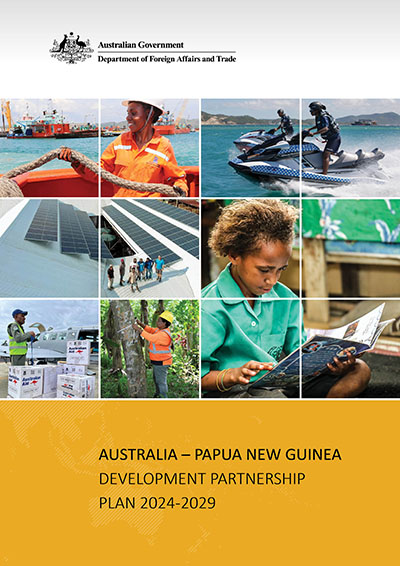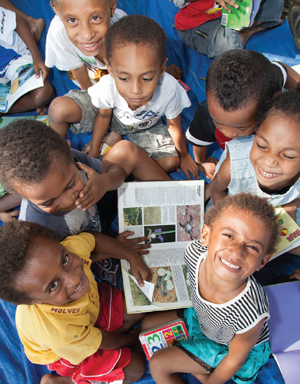-
2025-26 bilateral allocation [budget estimate]
-
$500.0 million
-
2025-26 total Australian ODA [budget estimate]
-
$707.0 million
-
2024-25 bilateral allocation [budget estimate]
-
$500.0 million
-
2024-25 total Australian ODA [budget estimate]
-
$637.4 million
-
2023-24 total Australian ODA [actual]
-
$579.7 million
Australia and Papua New Guinea (PNG) share a warm, broad-ranging relationship of deep historical and contemporary importance to both countries. Our modern partnership is underpinned by joint commitments to the PNG–Australia Comprehensive Strategic and Economic Partnership (2020), the Bilateral Security Agreement (2023), and the Papua New Guinea-Australia Mutual Defence Treaty (2025), which elevates our relationship to an Alliance.
PNG is Australia's largest development partner, with an estimated $707 million in Official Development Assistance (ODA) funding (2025–26), an expanding program of blended finance (loans and grants) for infrastructure development under the Australian Infrastructure Financing Facility for the Pacific (AIFFP), and $3.16 billion in budget support loans (non-ODA) since 2019,,linked to fiscal repair and economic reform. We have enduring people-to-people links, as PNG's largest trading partner and through Australian investments in PNG, as well as through our First Nations peoples and a wide range of institutional, cultural and sporting relationships. Australia is a trusted security partner for PNG through an extensive defence cooperation program and a long‑established policing partnership.
Joint Objectives of the Australia-Papua New Guinea Development Partnership
The overarching goal for the Australia–PNG development partnership is a peaceful, stable, resilient, and prosperous PNG.
Our four partnership objectives align with the principles and priorities agreed to by Australia and PNG, as set out in the PNG-Australia Comprehensive Strategic Economic Partnership and the Bilateral Security Agreement, and support the priorities presented in PNG's Medium Term Development Plan IV (MTDP IV). A mid cycle review (2026-27) of the DPP will be undertaken to evaluate progress and adjust as required, aligning with the end of the MTDP IV in 2027 and preparation for PNG's subsequent development plan.
Objective 1 – Building an economic partnership for prosperity
Our economic assistance is designed to help PNG better convert its natural endowments into sustained broad‑based growth, and create a more diversified economy, while maintaining economic stability. To support PNG's economic growth and prosperity, Australia is focusing investments on economic stability, high quality resilient infrastructure, and increasing economic opportunities for Papua New Guineans.
For more information on these programs see Building an economic partnership for prosperity page.
Objective 2 – Promoting improved law, order and governance
Stability and security are foundational elements of effective, accountable states. The rule of law is fundamental to the protection of rights and freedoms, the creation of legal frameworks that enable private sector investment and economic growth, and to peaceful dispute resolution. Challenges in internal security and governance deter investment in PNG, negatively impact productivity, and undermine human security and access to services for citizens. We are working with PNG to address these challenges through a significant increase in our policing, law and justice investments, and by promoting effective governance.
For more information on these programs see Promoting improved law, order and governance page.
Objective 3 – Investing in people and resilient communities
Human capital is essential for economic development and unlocking the full potential of PNG's growing, young population. We are investing in PNG's people by boosting our support for education, while maintaining key investments that promote better health and nutrition, improve outcomes for women and people with disabilities, and build resilience, including in the face of a changing climate.
For more information on these programs see Investing in people and resilient communities page.
Objective 4 – Building close friendships and enduring ties
As close friends and neighbours with a rich shared history, it is in our mutual interest to expand and deepen ties at all levels of our societies, in support of a peaceful, prosperous, and resilient Pacific. We are fostering stronger links between First Nations Australians and PNG, building on a shared history that goes back thousands of years, with Torres Strait Islanders and traditional inhabitants of PNG's southwestern coast sharing culture and kinship that continues today through the Torres Strait Treaty. This historical connection provides a unique opportunity to integrate First Nations perspectives into development initiatives.
For more information on these programs see Building close friendships and enduring ties page.
Climate Change
PNG ranks amongst the world's most climate vulnerable countries. The bulk of PNG's people depend on rain-fed, subsistence agriculture, leaving them vulnerable to changing weather patterns. Predictions of more frequent droughts and floods will reduce yields and reliability of subsistence crops and the geographic ranges of important cash crops. This in turn will increase poverty rates and worsen malnutrition. Climate events could lead to food insecurity, instability and increased internal migration, as occurred in 2015-16, when an estimated 460,000 people faced food insecurity due to failed crop production and water shortages. PNG already has the highest rate of malaria in the Asia-Pacific region and rising temperatures are expected to expand the geographical spread of malaria, dengue fever, leptospirosis, lymphatic filariasis, chikungunya and zika.
Economic impacts are also expected. Sea level rise, storm and disaster impacts will threaten key infrastructure; rainfall variability will impact the yield of cash crops; while climate impacts may increase the cost of doing business for the resources sector, causing a decline in government revenue. The global energy transition may present opportunities to expand critical minerals extraction (notably copper), however, this may be offset by declining global demand for liquified natural gas, PNG's most important export.
To further support the PNG Government's adaptation and mitigation priorities, Australia is deepening efforts to integrate climate considerations across the development program, capitalising on the strength of our partnerships built over many years. We ensure active consideration of climate risks in our programming across all key sectors and adapt our efforts to strengthen our support. A focus will be on increasing community resilience in the face of more frequent climate change-related weather events and sea-level rise. We utilise Australian government, university and research centre expertise to explore areas of cooperation to support communities to prepare for the likely impacts of climate change on agricultural production, food and water security and health. We also continue to support the capacity of the National Disaster Centre and build humanitarian response capabilities.
Gender Equality, Disability and Social Inclusion
The PNG Government has made some steps towards supporting gender equality with the establishment of the Permanent Parliamentary Committee on Gender Equality and Women's Empowerment, and an update underway of PNG's National Policy for Women and Gender Equality (2011—2015). Through the Medium Term Development Plan IV, PGK148.7 million (approximately $60 million) is committed over five years to improve PNG's standing in the Gender Parity Index for women in education, employment, and business; reduce gender-based violence (GBV); and quadruple the number of women in leadership.
PNG continues to have unacceptably high rates of Gender Based Violence, with over two-thirds of women having experienced physical or sexual violence by a partner. On average, 72 people per year experience sorcery-accusation related violence (SARV), which is primarily targeted towards women. These figures, likely, significantly under-represent the true number of incidents due to the lack of official data, along with non- and under-reporting. Women are significantly under-represented in leadership positions. The appointment of Ms. Elizabeth Genia, the first female Governor of the Bank of PNG in January 2024 is a notable achievement. People living with disabilities in PNG are largely invisible. An estimated 975,000 people in PNG live with disabilities, of which 98 per cent have no access to support services.
Mainstreaming efforts across the development program will recognise and prioritise people who are most likely to be left behind including women, the poor, rural populations, the elderly, youth, people living with HIV and LGBTQIA+ people.
First Nations
Australia's DPP for PNG respects and embeds the perspectives of First Nations Australians. PNG and Australia's shared history and cultural connections provide a unique foundation for partnerships that reflect the rich diversity, traditions, deep skills, and expertise of both communities. By embedding First Nations knowledge and practices in our international development efforts, we aim to foster more inclusive, sustainable, and culturally sensitive programs that benefit both our nations.
In line with this commitment, we will support initiatives that encourage meaningful engagements between First Nations Australians and PNG communities. This will include exploring opportunities to forge partnerships between PNG women's organisations and Australian First Nations organisations to share experiences, build trust, and work together to promote women's leadership, economic empowerment, and security. We will support programs that empower local leadership, respect cultural safety, promote cultural exchange, and value Indigenous knowledge and practices to address contemporary challenges. This principles-based approach enriches our partnerships but also ensures that development efforts are grounded in mutual respect and shared learning.



